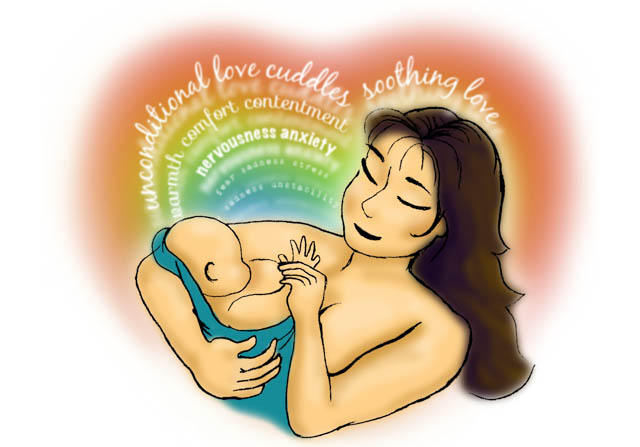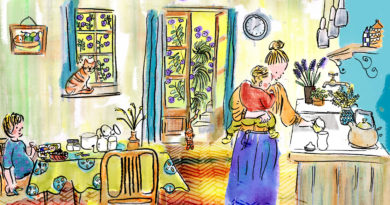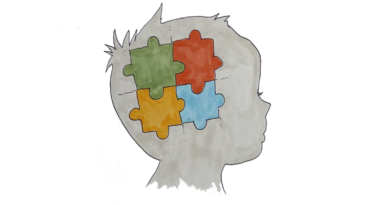The Emotional Side of Breastfeeding
 Mention emotions and breastfeeding, and most people think of post-natal blues and depression. And it is true that swinging emotions and hormones thrown into turmoil through the rapid changes from pregnancy to birth to breastfeeding can make mothers feel unsettled, unhappy and depressed. They feel they should be ecstatic over their newborns and are ashamed to admit that they are not. Sheila Kitzinger’s wonderful book The Year After Childbirth explains it all beautifully and offers many ideas for help getting over these baby blues or unhappiness. Kitzinger says that new mothers should be prepared for a roller coaster time of emotional upheaval and recognize that most mothers feel this way; however, if goes on for too long, mothers should not hesitate to seek expert help.
Mention emotions and breastfeeding, and most people think of post-natal blues and depression. And it is true that swinging emotions and hormones thrown into turmoil through the rapid changes from pregnancy to birth to breastfeeding can make mothers feel unsettled, unhappy and depressed. They feel they should be ecstatic over their newborns and are ashamed to admit that they are not. Sheila Kitzinger’s wonderful book The Year After Childbirth explains it all beautifully and offers many ideas for help getting over these baby blues or unhappiness. Kitzinger says that new mothers should be prepared for a roller coaster time of emotional upheaval and recognize that most mothers feel this way; however, if goes on for too long, mothers should not hesitate to seek expert help.
There are many other aspects of emotions and breastfeeding, and they are worth considering when making that all-important decision about how to feed your baby.
Prolactin and oxytocin – the two hormones which kick into action to make the milk and trigger its let-down – not only foster a strong connection with your baby, but they also help you recover from the emotional and physical stress of birth. Studies show that in the absence of these hormones, mothers tend to talk less to their babies, interact less and touch less.
As for your baby, he was born to expect the comfort of his mother’s breast. LLL’s manual The Womanly Art of Breastfeeding maintains that a baby’s nursing relationship is the foundation for the way he will think of himself and others. As one mother pointed out, bottles fill his stomach, but breastfeeding fills his soul.
There is a difference too in the intimacy of the feeding. When a mother breastfeeds, her whole body is involved, and with her baby’s cheeks on her skin, nursing is like a full-body hug. The emotional connection created by these repeated full-body hugs is very strong. A mother may find it hard to be separated from her baby for any length of time, especially in the early months. I remember trying to do some Christmas shopping and being pulled back by my newborn, left at home, well before I had finished with my list. Separation can create problems for the emotions as well as for the milk supply.
Nature needs for us mothers to take care of our babies and smooth their transition from birth into this world. So every time you breastfeed, a surge of hormones fills your body and gives you extra loving and nurturing feelings – and not just you, but also your husband or partner. Fathers, too, are affected by the emotions of fatherhood, and their hormones help them to feel loving and protective towards wife and baby, and to be extra tolerant and patient.
Breastfeeding eases the transition into motherhood. A breastfeeding mother is the baby’s sole food source and usually the one who can comfort him best. Her body responds instinctively to his cries, and can usually interpret them sooner than her partner. Day by day, breastfeeding helps to build up her confidence and mothering skills, and she gets tremendous satisfaction from seeing that her body is able to feed her baby.
Many bottle-feeding mothers wish that they had breastfed, yet very few breastfeeding mothers wish that they had bottle-fed. Whatever way they feed, all mothers love and value their babies equally. Yet LLL maintains there is a difference. When a formula-feeding mum hears her baby fuss or cry, she responds using mainly her mind. A breastfeeding mum hears her baby and responds with her whole body.
Breastfeeding can also help heal emotional wounds – past and present – from a difficult or traumatic birth or from an abusive past. Studies show that the soothing, peaceful feelings induced by these hormones and the joy of a happy, suckling baby, can heal pain from difficult emotional and physical experiences. Studies also show that the baby blues are more common in hospitals or communities where mother and baby are not able to nurse from birth and stay together night and day.
Many women are surprised by the passion they feel about breastfeeding, especially if they have to defend their decision. Meeting other breastfeeding women anywhere in the world, you feel a common bond and a connection, no matter how different the culture or circumstances, as shown in this anecdote from The Womanly Art of Breastfeeding:
I live near a community of Old Order Mennonites in the U.S. When we see each other in the store, we nod and smile and that’s all. But when I showed up with my baby and sat on a bench to breastfeed, three other mothers, wearing long dresses and bonnets came over and sat with me. As we sat together peacefully feeding our babies, our different ways of life seemed unimportant.
At our LLL monthly meetings we give mothers an opportunity to talk over the joys and challenges of feeding their babies and to share their many different emotions and feelings about breastfeeding. La Leche League Switzerland meetings can be found here.
By Joanna Koch
Joanna is a longtime La Leche League leader and a founding member of Mothering Matters. She is happy to have eight loving grandchildren.
For more articles about breastfeeding, see Mothering Matters’ bi-monthly LLL column.
Illustration by Jen Bognar



